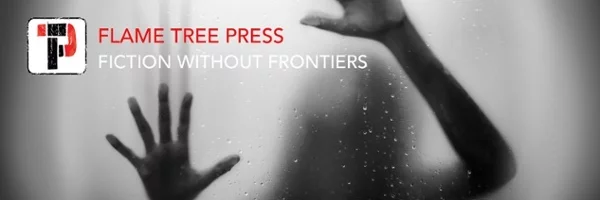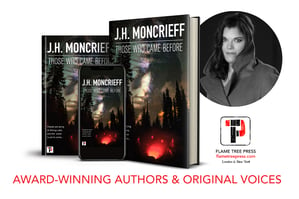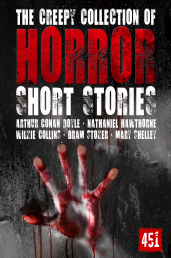In the first of this month's Q&As with our October authors, we have J.H. Moncrieff! She talks about what the themes of her latest novel are, some influences of the book and her favourite thing about being a writer! Be sure to check in tomorrow for more writing inspiration!

Can you describe your writing process?
My writing process is a bit strange. It begins with an initial idea—usually a “what if?” scenario. In a few days, a character will show up in my mind and begin telling me the story. My job is to write it down, almost like taking dictation. It feels like the character is a real person, separate from myself. I never have any idea where the story is going or how it will end. It’s always a surprise.
What are the underlying themes?
The main underlying theme is that the sins of the past will come back to haunt us, sometimes literally.
Did you base your characters on anyone you knew?
No, never, though I may borrow some names. Even if I start writing with someone I know or met in mind, the character quickly develops a life and personality of their own.
Who influenced you most in the writing of the book?
The earliest seeds of this book were planted by Ian Ross’s play, An Illustrated History of the Anishinabe, which tells stories of the horrible injustices done to North America’s indigenous people. A lot of these stories I did not know, and to say they disturbed me would be a huge understatement. Not enough people know about what happened, and I knew I would write about this one day. The most chilling horror in the world is the atrocities human beings perpetrate on other human beings (and other species, for that matter).
Is there any advice you can give someone starting to write?
Read a lot, write a lot, and submit your work. Submit, submit, submit. I’ve met so many talented writers who never send their work to anyone. Also, never give up. I’ve had some setbacks that stopped me from submitting my work for a long time, and I regret those lost years now. I’ve read posts from other writers saying that persistence and talent is not enough—you need luck too. And that may be true, but the more often you’re putting yourself out there, the greater your chances of “getting lucky,” so to speak.
Where did you write?
It depends on the weather. If it’s warm out, I write outside on the deck, surrounded by birds and squirrels. If it’s colder, I write in the bath. (Seriously!)
You have written a lot about characters facing supernatural situations. And you have based several of these novels on real places that you have visited. Which of these has scared you the most? Why?
The scariest place I’ve ever visited was Poveglia, an island off the coast of Venice that is considered to be the world’s most haunted. I don’t spook easily, but I was terrified the entire time I was there. Not only was I completely alone on the island, I was there during a violent thunderstorm. Poveglia has a truly chilling history. Although nothing overt happened to me–I didn’t see a ghost–there were definitely a lot of strange, unexplained sounds and a very strong sensation that something was wrong in that place. It’s very creepy.
In addition to your fiction, you’ve had an extensive career as a journalist. Did you always know you wanted to write fiction, and how has your background in journalism dovetailed with the horror genre?
Even though I knew from a very young age that I wanted to be a novelist, I was raised in a practical family. I thought it would be a great idea to learn a writing trade that could pay the bills while I worked on getting a novel published, and that’s how I became a journalist.
Most of my horror revolves around the evil that exists in people, so journalism gave me plenty of chilling examples. I’ll never forget the neighborhood that stayed awake all night to keep their homes from falling prey to an arsonist, or the mother whose baby was stolen from her. Journalism also taught me how to be a full-time working writer, and to treat writing as a business.
What is the best piece of advice you have ever received with regards to writing?
Find your people. It’s easy to get upset over bad reviews, internet trolls, and rejections, but those people aren’t “your” people and you can’t please everyone. Finding your people changes where you put your energy and time. If someone’s already told you they’re not interested in what you do, it’s a lot better to spend your energy on the people who are interested rather than struggling to convert those who aren’t. (And I’m not sure it’s possible to convert those who aren’t.)
What’s the best thing about being a writer?
As a writer, you get to be your own therapist. I don't know what it is about writing, but it seems to resolve almost every problem, probably because most of our problems are in our own heads.
Thank you!
Thank you to J.H. for taking the time to talk today about Those Who Came Before. You can pick up this new FLAME TREE PRESS edition of his book, along with the other October releases now. It will be available in paperback, hardback and ebook. Check out our website for details.

J.H. Moncrieff's City of Ghosts won the 2018 Kindle Book Review Award for best Horror/Suspense. Reviewers have described her work as early Gillian Flynn with a little Ray Bradbury and Stephen King thrown in for good measure. She won Harlequin's search for "the next Gillian Flynn" in 2016. Her first published novella, The Bear Who Wouldn't Leave, was featured in Samhain's Childhood Fears collection and stayed on its horror bestsellers list for over a year.
When not writing, she loves exploring the world's most haunted places, advocating for animal rights, and summoning her inner ninja in muay thai class.
Visit her website here.
- FLAME TREE PRESS | October Releases | 1 | J.H. Moncrieff Q&A
- FLAME TREE PRESS | October Releases | 2 | Ramsey Campbell Q&A
- FLAME TREE PRESS | October Releases | 3 | Frazer Lee Q&A
- FLAME TREE PRESS | October Releases | 4 | Hunter Shea Q&A
- FLAME TREE PRESS | October Releases | 5 | Upcoming Titles




